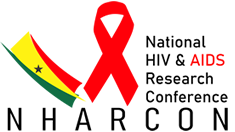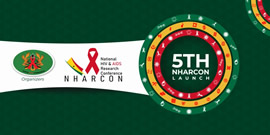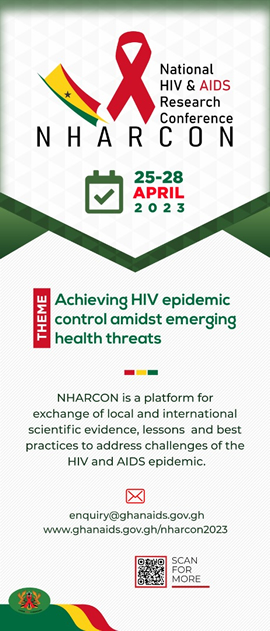Public health threats such as covid-19 continue to have catastrophic impact on the most vulnerable communities around the world and threatens progress made in mitigating the impact of HIV and TB globally. This creates a gap in the fight to mitigate the impacts on lifesaving HIV and TB programmes, leading to fragile health systems being overwhelmed. Even under the threat of public health emergencies, we must not relent in our goal for an AIDS free Ghana. It is imperative for the continent to rely on the dynamics of recent scientific advances, on a plea that will respond to a mobilization of internal and endogenous resources.
The convening of the National HIV and AIDS Research Conference (NHARCON) in Accra, Ghana in April 2023 presents an opportunity to highlight the diverse nature of Ghana’s HIV epidemic and the unique response to it.
The overall Objective of NHARCON is to provide a platform for the exchange of local and global research and best practices towards achieving epidemic control in Ghana
The specific objectives of the conference are to:
- share knowledge and best practices for HIV interventions.
- disseminate findings from relevant HIV and AIDS research undertaken in Ghana and elsewhere
- provide the opportunity for researchers from around the world to share the latest scientific advances in the field, learn from one another’s expertise
- review strategies for advancing the fast track 95-95-95 strategy.
- discuss and identify future programme strategies and research priorities in light of evidence and best practices
- To provide mentorship for less experienced researchers to develop concept notes, abstracts and presentations.
NHARCON 2023 will be organized by the government of Ghana from 25th – 28th April 2023. It will take place onsite in Accra at the University of Professional Studies, will be complemented by an engaging and interactive online platform that will mirror the scientific programme and industry sponsored sessions.
NHARCON is gathering for all working in the field of Health as well as leaders, people living with HIV and others committed to ending the epidemic. It will be a tremendous opportunity for researchers, clinicians from around the world to share the latest scientific advances, learn from one another’s expertise, and develop strategies for advancing all facets of our collective efforts to end AIDS by 2030. We look forward to a strong global partnership among science, leadership and community in building a conference programme that will speed up the end of the AIDS epidemic.


